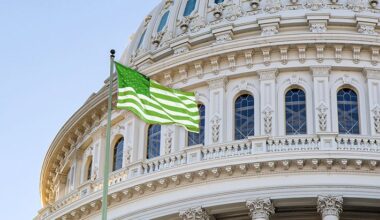“It has set up a system where you are going to have very few individuals controlling the marijuana market in Arkansas, and that is just not good for consumers.”
By Hunter Field, Arkansas Advocate
The staunchest opposition to this year’s recreational marijuana ballot initiative comes from an unexpected group—Arkansas’ most prominent advocates for cannabis legalization.
This band of activists is willing to wait at least another two years to transition the drug’s status in the state from strictly medical to recreational.
To them, a vote for the Arkansas Adult Use Cannabis Amendment would be a vote for a thinly veiled money grab with overly restrictive rules that would be cemented into the Arkansas Constitution.
Opponents of the measure include:
- Melissa Fults, treasurer of the pro-marijuana advocacy group Arkansas NORML who has helped lead several medical and recreational cannabis ballot measures in the last few decades. The group also plans to offer a recreational amendment in 2024.
- David Couch, the Little Rock attorney who drafted the constitutional amendment that legalized medical marijuana in Arkansas.
- Many members and leaders of the grassroots advocacy group Arkansas True Grass, which tried unsuccessfully this year to gather signatures for a recreational cannabis ballot initiative.
Fults said it’s difficult to change an existing amendment once it’s passed.
“It’s worth the risk to vote ‘No,’” Fults said. “Something is not always better than nothing. This is not better than nothing. This is actually worse.”
Whether the Adult Use Cannabis Amendment will appear on November’s ballot remains to be seen. Responsible Growth Arkansas, the group offering the amendment, gathered enough signatures, but the Arkansas State Board of Election Commissioners disqualified the amendment for what board members said was an unclear popular name and ballot title.
Responsible Growth Arkansas appealed the board’s decision to the Arkansas Supreme Court.
The High Court on Wednesday agreed to expedite the matter and ordered the Arkansas Secretary of State’s office to include the amendment when it begins printing ballots for the November election later this month. If the court agrees that the measure should be disqualified, votes won’t be counted.
Justices asked for the last briefs in the case to be filed in early September, setting up a possible decision later next month.
The amendment
Steve Lancaster, counsel for Responsible Growth Arkansas, said the group believes Arkansans are ready for recreational cannabis. He said the more than 200,000 signatures the group submitted demonstrated statewide support from a variety of different political backgrounds.
Arkansas would become the 20th state in the U.S. to legalize cannabis for recreational use.
As for the opposition of cannabis proponents, Lancaster said he understood their position. However, he said Responsible Growth tried to balance drafting an amendment that created a robust recreational program while not going too far and risking alienating voters that may only want a tightly regulated program.
The group, he said, had to make some tough decisions.
“I think ultimately we’re in Arkansas, and there are some things we can get and some things I don’t think voters are ready to give,” he said. “What we did was try to put together an amendment we think would be satisfactory to Arkansas voters. The issues like expungement and things like that, I don’t think any of us have any opposition to that.”
Lancaster was referring to one gripe from some marijuana advocates that the amendment doesn’t include a provision that would expunge past marijuana-related offenses.
Couch said that omitting expungement from the amendment creates an unfair situation where some people could have a criminal record for something that is no longer illegal.
Lancaster noted that the Arkansas General Assembly could take up expungement if Responsible Growth’s amendment passes.
The primary complaint, though, from people like Couch and Fults is the way Responsible Growth’s amendment would configure the market. The number of dispensary and cultivation licenses would be limited and dominated by the existing medical marijuana dispensaries and growers.
There would be no provision allowing Arkansans to grow their own marijuana at home, and it also would remove some of the current restrictions on owning stakes in multiple marijuana businesses.
“It has set up a system where you are going to have very few individuals controlling the marijuana market in Arkansas, and that is just not good for consumers,” Couch said.
Nearly all of Responsible Growth’s fundraising (well beyond $3 million already) has come from the state’s medical marijuana industry. The group’s startup cash came from $350,000 in contributions from each of the first five companies holding medical marijuana cultivation licenses, according to Arkansas Ethics Commission filings. Some of those growing companies have given hundreds of thousands more to the effort.
This has chafed some.
“They’re using money earned off the backs of patients to feed their greed,” Fults said.
Couch said a more free market would be preferable, pointing to Oklahoma where there is no cap on dispensary licenses and medical cannabis is cheaper than in the Natural State.
Other supporters, opponents
The amendment has received public support from several prominent Arkansans.
Democratic gubernatorial candidate Chris Jones announced his support of the amendment earlier this month. Libertarian gubernatorial nominee Ricky Dale Harrington Jr. has also made his support public.
Republican gubernatorial candidate Sarah Huckabee Sanders hasn’t yet taken a public position on the issue.
In addition to some cannabis advocates, a ballot question committee was formed in July to oppose Responsible Growth’s amendment.
There’s little information available about the group, Safe and Secure Communities. Michael McCauley, an Illinois accountant, is listed as the group’s treasurer. Reached by phone last week, he said he wasn’t able to provide any information about the group beyond the information in its public filing.
Family Council, a conservative group that has actively fought against past marijuana measures, will again oppose this year’s measure.
This story was first published by Arkansas Advocate.
Medical Disclaimer:
The information provided in these blog posts is intended for general informational and educational purposes only. It is not a substitute for professional medical advice, diagnosis, or treatment. Always seek the advice of your physician or other qualified healthcare provider with any questions you may have regarding a medical condition. The use of any information provided in these blog posts is solely at your own risk. The authors and the website do not recommend or endorse any specific products, treatments, or procedures mentioned. Reliance on any information in these blog posts is solely at your own discretion.







